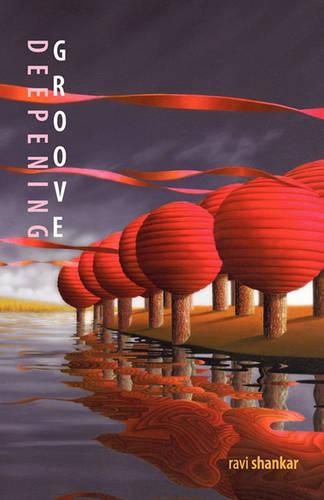Readings Newsletter
Become a Readings Member to make your shopping experience even easier.
Sign in or sign up for free!
You’re not far away from qualifying for FREE standard shipping within Australia
You’ve qualified for FREE standard shipping within Australia
The cart is loading…






The poems in Deepening Groove proceed in elegant triplets that drift effortlessly down the page on waves of sound, serenely self-confident. The subjects are animals, trees, flowers, fish, the weather, and the human condition, all mixed up in a heady stew that simmers quietly one minute, and shimmers brightly the next. This is a book of savvy, delicious surprises. -Wyn Cooper In Deepening Groove, Ravi Shankar’s poems are small wonders of defining, seeing, and sound. He is a poet fascinated with transformations and here are shiftings of dust and sand, loon calls, flutterings of insects, changing tides and splendid cascades- always information-driven, often rapturous with Hopkins-like intensities, imperatives, and trochaic stresses. What I’m most taken by is how the poems both see and feel simultaneously: In Dark,
Darkness in New England has a flavor close / to anise, a texture plush as peat moss. In Bats, the bats’ flight is carrying away pieces of us, / a maelstrom too faint to see, turning to ellipsis…. In virtually all these poems, to quote words from Willard Pond, there is a sense // that the distance between the alternate / universes humans [and other creatures on Earth] inhabit is smaller / than ever imagined and more astonishing. And although the poems give special pleasures on first encounters, they contain-as in The Oyster - secrets that require / a knife to pry open and vinegar to serve. Deepening Groove shows Ravi Shankar is truly, now, one of America’s finest younger poets. -Dick Allen Ravi Shankar is Executive Director of Drunken Boat and Co-Director of the Creative Writing Program at Central Connecticut State University. His first full length book was Instrumentality (Word Press, 2004). Along with Tina Chang and Nathalie Handal, he edited Language for a New Century: Contemporary Poetry from Asia, the Middle East & Beyond (W.W. Norton & Co.). He has appeared in the New York Times and the Chronicle of Higher Education, and on the BBC and NPR. He teaches in Fairfield University’s MFA Program and in the first international MFA Program at City University of Hong Kong.
$9.00 standard shipping within Australia
FREE standard shipping within Australia for orders over $100.00
Express & International shipping calculated at checkout
The poems in Deepening Groove proceed in elegant triplets that drift effortlessly down the page on waves of sound, serenely self-confident. The subjects are animals, trees, flowers, fish, the weather, and the human condition, all mixed up in a heady stew that simmers quietly one minute, and shimmers brightly the next. This is a book of savvy, delicious surprises. -Wyn Cooper In Deepening Groove, Ravi Shankar’s poems are small wonders of defining, seeing, and sound. He is a poet fascinated with transformations and here are shiftings of dust and sand, loon calls, flutterings of insects, changing tides and splendid cascades- always information-driven, often rapturous with Hopkins-like intensities, imperatives, and trochaic stresses. What I’m most taken by is how the poems both see and feel simultaneously: In Dark,
Darkness in New England has a flavor close / to anise, a texture plush as peat moss. In Bats, the bats’ flight is carrying away pieces of us, / a maelstrom too faint to see, turning to ellipsis…. In virtually all these poems, to quote words from Willard Pond, there is a sense // that the distance between the alternate / universes humans [and other creatures on Earth] inhabit is smaller / than ever imagined and more astonishing. And although the poems give special pleasures on first encounters, they contain-as in The Oyster - secrets that require / a knife to pry open and vinegar to serve. Deepening Groove shows Ravi Shankar is truly, now, one of America’s finest younger poets. -Dick Allen Ravi Shankar is Executive Director of Drunken Boat and Co-Director of the Creative Writing Program at Central Connecticut State University. His first full length book was Instrumentality (Word Press, 2004). Along with Tina Chang and Nathalie Handal, he edited Language for a New Century: Contemporary Poetry from Asia, the Middle East & Beyond (W.W. Norton & Co.). He has appeared in the New York Times and the Chronicle of Higher Education, and on the BBC and NPR. He teaches in Fairfield University’s MFA Program and in the first international MFA Program at City University of Hong Kong.